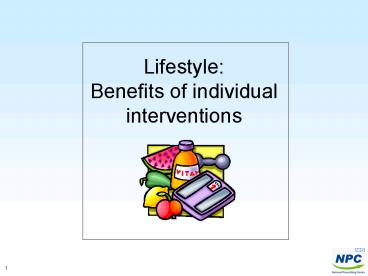Lifestyle: Benefits of individual interventions - PowerPoint PPT Presentation
1 / 8
Title:
Lifestyle: Benefits of individual interventions
Description:
At least 2 portions of oily fish per week. Limited salt intake (max 6 g/day) ... Oily fish may protect against CHD. The DASH diet reduces BP. Lowering salt ... – PowerPoint PPT presentation
Number of Views:74
Avg rating:3.0/5.0
Title: Lifestyle: Benefits of individual interventions
1
LifestyleBenefits of individual interventions
2
What is a healthy lifestyle?
- Dont smoke
- Maintain a normal body weight for adults (BMI
18.5 to 24.9 kg/m2) - Eat a healthy balanced diet
- Plenty of fruit and vegetables (at least 5
portions/day), nuts, fish and fibre (approx
18g/day) - Limited dairy products and meat
- Avoid saturated fat mono-unsaturated vegetable
oils are preferable - At least 2 portions of oily fish per week
- Limited salt intake (max 6 g/day)
- Avoid processed foods
- Engage in regular physical activity of moderate
intensity for at least 30 minutes per day, most
days of the week - Limit daily alcohol consumption
3
Benefits of smoking cessation BMJ Group. Putting
evidence into practice smoking cessation. 2007
CDC. The Health Consequences of Smoking what it
means to you. 2004
- There is good evidence that stopping smoking
reduces the risk of - all-cause mortality
- CHD and stroke
- lung cancer
- It also reduces the rate of deterioration in COPD
- Stopping smoking at any age is beneficial to the
health of smokers and those people around them - The earlier a person stops smoking the better
- but better late than never
4
Benefits of losing weight Avenell A, et al. HTA
2004821Lean MEJ, et al. BMJ 2005330133940
- Losing weight is associated with a reduction in
- Mortality (all cause, cancer, CVD and
diabetes-related) - The risk of developing type 2 diabetes
- Hypertension
- Cholesterol
- Move a little more, eat a little less
- 90 of obesity in the USA could be abolished by
- walking an extra 2000 steps a day (about a mile)
- and
- reducing dietary intake by 0.418MJ (100kcal)
per day - 100 kcal a pat of butter or 2 Jaffa cakes
or 5 Rolos or 1 small Kit Kat or ½ a Lion bar - www.americaonthemove.org
5
NICE diet recommendations NICE. Clinical
Guideline 43. Dec 2006 Premier Collaborative
Research Group. JAMA 2003289208393 Sacks FM,
et al. N Engl J Med 2001344310
- Total energy intake should be less than
expenditure - For sustainable weight loss, recommend diets with
600kcal/day deficit or those that reduce calories
by lowering fat content, in combination with
expert support and intensive follow-up - Low calorie diets (10001600 kcal/day) may be
considered but are less likely to be
nutritionally complete - In the longer term, people should move towards
eating a balanced diet, consistent with other
healthy eating advice - People should be encouraged to improve their diet
even if they do not lose weight, because there
can be other health benefits - A Mediterranean diet is associated with a reduced
risk of death (all cause mortality, CHD and
cancer) - Oily fish may protect against CHD
- The DASH diet reduces BP
- Lowering salt intake reduces BP
6
Benefits of limiting alcohol intake Castelnuovo
AD, et al. Arch Intern Med 2006166243745 DH.
Safe. Sensible. Social. 2007
- Consumption of 24 drinks in men and 12 drinks
in women is associated with a reduced risk of
mortality - Higher levels of drinking are associated with an
increased risk of mortality - Men should not regularly drink more than 34
units of alcohol/day - Women should not regularly drink more than 23
units of alcohol/day - After an episode of heavy drinking refrain from
drinking for 48 hours
7
Benefits of physical activity DH. At least five
a week. 2004
- Strong evidence that physical activity helps
prevent CHD, stroke, type 2 diabetes,
osteoporosis, colon cancer and breast cancer - Strong evidence that it is useful to treat low
back pain - Moderate evidence that it is a useful treatment
for CHD, peripheral vascular disease, obesity,
osteoarthritis and depression - Helping inactive people to become moderately
active will produce the greatest reduction in
risk to the population - The health benefits far outweigh any risks
8
Summary
- We have good observational data and some RCT
evidence that improving lifestyle improves health
or protects against disease - So following a healthy lifestyle not smoking,
eating a balanced diet, limiting alcohol intake
and exercising regularly would seem to be
sensible - It may help to
- Reduce the risks of becoming ill
- Modify risk factors
- Control disease
- Reduce mortality
- Avoid the need for drug treatment and the
associated risks - On a population basis small changes are likely to
have the biggest benefits - Although the evidence for multiple interventions
is limited small changes in several areas may
improve health outcomes further - Its never too late to adopt a healthy lifestyle































